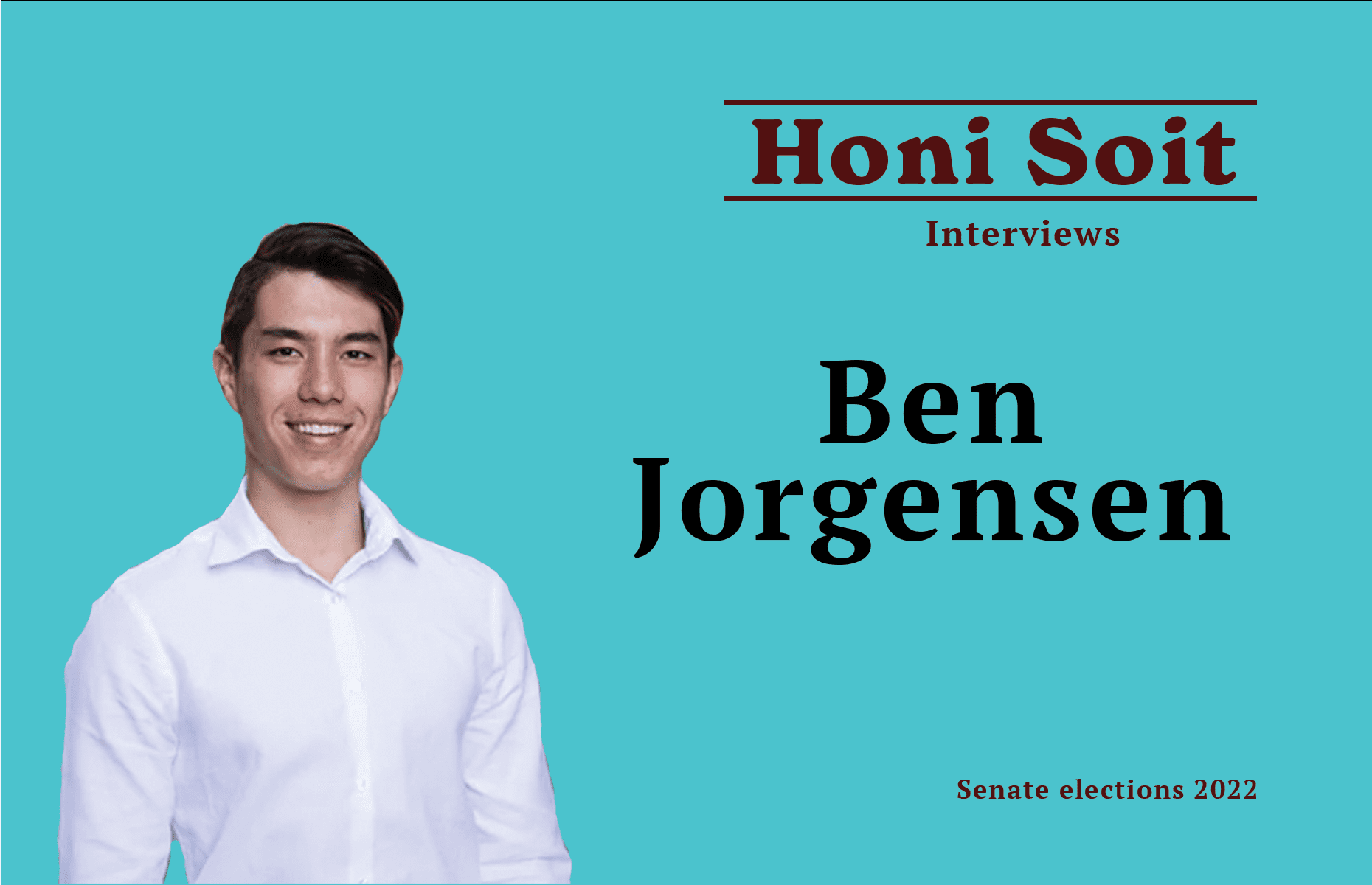Degree: Bachelor of Arts, III
Factional affiliation: Liberals
A third-year Arts student, Ben Jorgensen describes himself as an experienced candidate with “a plan for the future”. Thus far, Jorgensen’s Senate campaign is the most visible and expansive of the three candidates, characterised by online messaging, flyers on campus and in-person campaigning – all of which is personally funded. This is clearly the result of his previous electoral experience; he was involved in the Liberal-branded TIME, STRIVE and LIFT SRC tickets between 2020-2022, and he managed Nicholas Comino’s (ModLib) USU campaign last year.
In addition to his participation in elections, he cited his leadership experience on the executive of a number of clubs and societies, such as the Sydney Arts Students’ Society (SASS), the Multiracial Intercultural Experience Society (MixSoc), and the Puzzle Society. He was also a Conservative Club executive in 2020-2021. Despite this, he faltered when asked questions involving institutional knowledge of the University Senate, failing to identify more than three of the current fifteen Senate fellows, and struggling to identify Mark Scott as Vice-Chancellor.
Jorgensen expressed his desire to “give back to the community” as his motivation for running for Senate fellow, however he also noted that he wished to “seize this opportunity” for himself towards the end of his degree. Considering that he is framing himself as a “staunch student advocate” in his online campaign messages and has promised to “fight tooth and nail” for students if elected, it remains unclear how Jorgensen will balance the personal opportunity of Senate membership against standing up for student interests.
When asked about his political affiliations, Jorgensen did not shy away from disclosing his affiliation with the Liberals. He described his political orientation as centre-right, being “socially progressive” but leaning to the right when it came to economics. Whilst he said his personal politics would “inform the strategy he puts forward”, he did not think it should affect his ability to fulfil his responsibilities, if elected.
Many of Jorgensen’s policy platforms centre on reforming administrative services such as special considerations, Late Discontinue Not To Count as Fail and ProctorU. He cited ongoing issues with long waiting times and the volume of backlogs as an issue with special considerations. Interestingly, he proposed involving Academic Advisors within this process to increase student communication, although Honi has concerns as to how this might adversely affect staff’s administrative burden, considering many Academic Advisors are academics themselves with research roles.
His policy also refers to addressing the student-to-staff ratio and putting an end to recycled lectures, which are both issues intimately linked to staff working conditions. Concerningly, when asked whether these policies were related to the National Tertiary Education Union’s (NTEU) campaign, he admitted that he was “not too familiar with that campaign”. Considering that the staff strikes have been one of the most visible and intensive campaigns on campus this year, Jorgensen’s lack of familiarity with the NTEU and their demands leaves Honi questioning his suitability to enact these promises, which were certainly light on details as to their implementation.
On budget and finances, Jorgensen is proposing a review into Student Services and Amenities Fee (SSAF) allocations. Although he emphasised the need for organisations providing student services to have adequate funding, he was unable to clearly articulate why such a review was necessary; when asked whether he thought certain organisations needed more or less SSAF funding, he replied that “he didn’t think so”. In regards to the University Executive’s concerning spending habits, Jorgensen was careful to refrain from outright criticising the Executive. He described those expenditures as “not necessarily justified”, although qualified this by saying that he could not make a proper judgement due to a lack of transparency.
Jorgensen hesitated to be critical of outgoing student fellows Gabi Stricker-Phelps and Lachlan Finch, who both have similar political leanings to him, when asked to compare his approach to theirs. He said that as a point of differentiation, he promised to “speak to students on all issues and provide them with regular updates”. He also committed to attending SRC meetings regularly as another point of contrast from Stricker-Phelps (who has barely attended any SRC meetings during her term as undergraduate fellow), and meeting with both SRC and USU representatives bimonthly. Considering that previous Senate fellows have historically had distant, if not antagonistic, relationships with these student organisations, Honi is curious to see how Jorgensen plans to bridge that gap.
It is also interesting to note that Jorgensen repeatedly referred to the Senate as the ‘Board’. Whether this indicates his confusion with the USU, Academic Board or his view of the Senate as more of a corporate rather than a democratic governance body, Honi is unclear. Additionally, a number of his policies appear more suited for the University of Sydney Union, for example a proposal to work with the heads of faculty societies.
“Have a look at all the other candidates. The future of our education matters, and it’s important that we have a really good, strong student representative on the Board. With both my experience and my plan for the future, I’d really appreciate your vote,” Jorgensen said.
Voting for Student Senate Fellow elections are now open, and will close at 4pm on Tuesday, 18 October.





